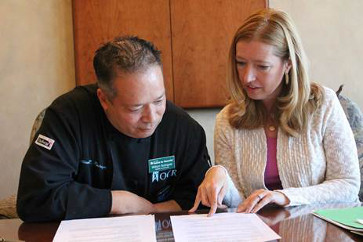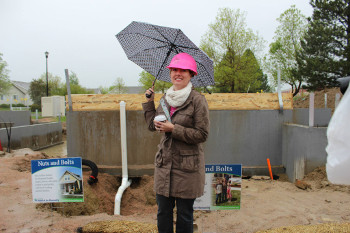Beth Rosen, Affordable Housing Program Administrator

 Courtesy of Raquel Martinez, Annual Campaign & Communications Manager, Habitat for Humanity.
Courtesy of Raquel Martinez, Annual Campaign & Communications Manager, Habitat for Humanity.
As Julie Dale, owner of Julie A Dale Closing Services, makes final adjustments to the closing documents, the seven people in the Home State Bank conference room quietly chat. Plastic cups and an unopened bottle of Martinelli’s sit in the middle of the table, awaiting the celebration to come.
Beth Rosen, the City’s Affordable Housing Program Administrator, leans over to William Rodriguez, cheerfully sharing how much she enjoyed her walk-through of his beautiful new Habitat for Humanity home. Rodriguez, a chef and single parent, will live there with his son and daughter.
The Habitat home is Rodriguez’s first.
The property was purchased by Habitat for Humanity with Community Development Block Grant (CDBG) funds allocated by the City. Now that the home is built and Rodriguez is closing, his loan is being transferred from Habitat for Humanity to the City. Rosen is there to sign the promissory note between the City and Rodriguez.
Rosen explains that the Rodriguez home is one of five lots purchased with CDBG funds that get converted to home equity for the buyer. Habitat for Humanity uses the funds to pay for the lots up front and then, after the homes are built, that equity reduces the purchase price for the buyer. The homeowner obtains a zero-interest loan only for the cost of the house. Monthly payments are no more than 30 percent of the buyer’s income.
“I can show you what I’ll have you sign,” Rosen says to Rodriguez, pointing at the documents. “Initially, Habitat acquired land received through federal funds. That loan stays on the land–it has to be affordable for you or your subsequent buyer for 20 years.”
Also in the room for the Rodriguez family closing are representatives of Habitat for Humanity, the Fort Collins Housing Authority and Home State Bank.
“I love these relationships with my peers,” says Rosen, a fifth-generation Fort Collins area resident. “It’s fun when I get to see the home and meet the buyer.”
Rosen understands what people like Rodriguez are facing. Her parents divorced when she was seven and her mother struggled to raise her two daughters on waitress wages. Later in life, Rosen’s mother completed a master’s degree in human development and family studies, and a doctorate in counseling psychology. Both daughters remained committed to the city in which they were raised and pursued educations in related fields. Before joining the City, Rosen worked as assistant director for Neighbor-to-Neighbor, a local affordable housing non-profit. Her sister, Jennifer Cross, is a sociology professor at Colorado State University and research director for the Institute for the Built Environment.
Rosen administers federal and City funds for affordable housing programs and ensures compliance with federal regulations. She says these closings are some of the best times she has in her job working in the City’s Social Sustainability department–the newest department at the City within the Sustainability Services Area.
“I enjoy the end result, the product, and the relationships with the housing providers, and ultimately meeting the residents who benefit from the housing. When they’ve successfully achieved their housing goals - that’s really exciting and rewarding. It’s so rewarding to be involved in work that helps stabilize families and helps them move up the socioeconomic ladder.”